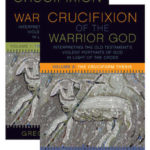We run our website the way we wished the whole internet worked: we provide high quality original content with no ads. We are funded solely by your direct support. Please consider supporting this project.

Who Rules Governments? God or Satan? Part 2
In the previous post, I raised the question of how we reconcile the fact that the Bible depicts both God and Satan as the ruler of nations, and I discussed some classical ways this has been understood. In this post I want to offer a cross-centered approach to this classical conundrum that provides us with a compelling way of resolving it while at the same time disclosing how this tension bears witness to the crucified Christ.
To begin, I would argue that humans surrendered to Satan our God-given authority to lovingly rule this world (Gen 1:26-8) when we rebelled against God in our primordial past, as reflected in the Genesis story of Adam and Eve. It is for this reason, in my view, that Jesus accepted Satan’s claim to have been “given” all the authority of the world’s kingdoms (Lk 4:6-7). By seducing us, Satan became the archon of the world and thus became the functional CEO, as it were, of every regime that exercises power over others. We therefore need never, and should never, attribute to God any of the injustices and violence that have accompanied the world’s governments throughout history.
Rather, as is true for every other aspect of creation, every aspect of the world’s governments that fails to reflect the benevolent character of the Creator, as revealed in the crucified Christ, should be considered to be the result of decisions made by agents other than God. Since our Father plants only wheat—“every good … gift comes from … the Father of heavenly lights” (Ja 1:17)—when we find tares in the field of his creation, whether they be in government or in nature, we must acknowledge that “[a]n enemy has done this” (Mt 13:29, 38). To be sure, we can be confident that the infinitely wise God always has a wise plan that he has been preparing from the foundation of the world as to how he will use every particular evil to further his purposes. But we need not think it is ever God’s will for the evil he uses to good purposes to be present in government or in nature in the first place.
This perspective finds exegetical support in the fact that the word Paul uses when he says all authorities have been “established (tassō) by God” (Rom 13:1) has the connotation of something being “ordered,” “arranged” or “filed.” As Yoder has argued, the fact that a librarian files a book in its proper place tells us nothing about what the librarian thinks about the book. She may in fact absolutely loathe the work, yet it is her job to file the book where it belongs. Similarly, the fact that God arranges or orders governments as he finds them, weaving them into his sovereign purposes as much as possible, does not in any way entail that he approves of them, let alone that he meticulously controls them. It simply means that, as we see him doing throughout the OT, God weaves the often-unjust sword-wielding activity of these governments into his sovereign plans, given that these governments have, of their own accord, acquired the kind of sword-wielding character they have.
Pulling together the various strands of Scripture that pertain to this question, it seems evident that Satan is the immediate functional ruler of the world’s governments, using his influence to kill, steal and destroy as much as possible, though God is the ultimate ruler of the world’s governments, wisely responding to Satan’s activity to bring good out of them.
Yet, we need not insist that any particular OT author had this distinction in mind when they depict God as the unilateral ruler of the world’s governments, any more than we need to pretend that OT authors did not intend to ascribe evil activities to God when they depict him as doing what he in fact merely allowed. The wisdom of God that outwitted our cosmic oppressors on Calvary was largely hidden from these authors, just as their sin, to one degree or another, hid God’s true self-sacrificial character from them.
As we assess their written witness to God’s covenantal activity through the lens of the cross, we can discern God’s wisdom and God’s true character present in the depths of their pen-ultimate depictions of God. For when they reflect their Ancient Near Eastern conceptions of God by portraying him doing what he merely allowed, our cross-centered perspective enables us to discern a harbinger of the cross, on which God assumed responsibility for all that he allowed to take place in his creation.
Photo credit: Kay Gaensler via VisualHunt.com / CC BY-NC-SA
Category: General
Tags: Cruciform Theology, Government, Open Theism, Power, Satan
Related Reading

Molinism and Open Theism – Part I
I’ve been asked for the umpteenth time on Twitter lately about the difference between “Molinism” and “Open Theism,” and for some reason, today seemed like a good day to begin addressing this question. I’ll do this in two parts. Today I’ll outline and critique Molinism, and in a subsequent post I’ll raise yet another critique as…

Podcast: Can Government Be Saved?
Greg talks about Shane Claiborne, government, and ministry. http://traffic.libsyn.com/askgregboyd/Episode_0430.mp3

Crucifixion of the Warrior God Update
Did you know that authors generally don’t have much say-so about the cover art for their books? It’s considered part of the marketing, so the author may or may not like how it ends up looking. I’ve had a few book covers that made me scratch my head. (I won’t tell you which ones, but it would…

Open Theism Timeline
Open Theism Timeline by Tom Lukashow An argument that is frequently raised against the open view is that it is a recent innovation. Paul Eddy had discovered Calcidius, a fifth century advocate, and I and others knew of L.D. McCabe and Billy Hibbard, two 19th century advocates. But that was about it – until I…

Revelation 13:8 refers to “everyone whose names have not been written before the foundation of the world in the book of life.” How does that square with open theism?
Three possibilities exist in terms of reconciling Revelation 13:8 with open theism. 1) First, the “from the foundation of the world” clause can attach to either “everyone whose names have not been written” or to “the lamb that was slain.” For example, the TNIV translates this passage “All inhabitants of the earth will worship the…

What If Open Theism is Not True? What Would Be the Practical Implications?
In this episode Greg talks about what the practical implication would be if Open Theism is not true. Our favorite quote from this episode: “There is no way to live as if we are predestined.” http://traffic.libsyn.com/askgregboyd/Episode_0010.mp3
